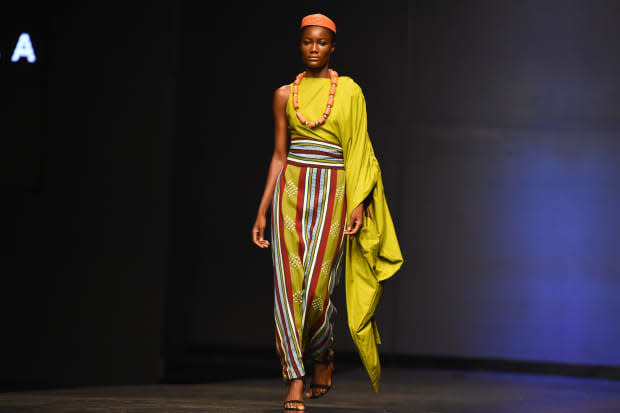Must Read: Reframing Cultural Appropriation as a Discussion of Ideas, Tom Ford on Making American Fashion Great Again
Plus, Kanye West debuted church merch at Coachella's Sunday Service.

These are the stories making headlines in fashion on Monday.
Reframing cultural appropriation as a discussion of ideas
"The impulse to play dress-up in other people's cultures goes beyond teenagers wearing qipaos to prom, or Coachella girls in feathered headdresses," writes Connie Wang for The New York Times. "It's an impulse that is nearly universal." So, what do people get out of adopting aesthetics from other cultures? It's a form of communication — one that's not always hurtful or condescending — but one that can say something important. "We've landed on treating cultural appropriation as a bad habit to be trained out of us," Wang explains. "But this balancing act is worth performing. Because the bad-habit model is not only exhausting; the result is often that people are so afraid of appearing 'bad' that they self-censor good-faith impulses to try something new. Ironically, in doing so, they learn less about other cultures." {The New York Times}
Tom Ford on making American fashion great again
Tom Ford's impressive portfolio of work is synonymous with sex and excess, but the designer himself is a shy, devoted family guy. While sharing a piece of lemon meringue pie, Maureen Dowd spoke with the celebrated provocateur about everything from his southern upbringing to how he plans to make American fashion great again as the newly appointed head of the CFDA. {The New York Times}
Kanye West debuted church merch at Coachella's Sunday Service
Kanye West celebrated Easter by taking his Sunday Service to Coachella. Following his spiritual desert program, West set up a booth to sell his special Sunday Service merch, a collection of nondescript and neutral-colored clothing items — much like his own Yeezy line. The worship-friendly range includes hoodies, socks, sweatshirts and T-shirts, emblazoned with religious words and phrases, such as "Holy Spirit," "Trust God" and "At the Mountain," a reference to the Coachella area where his Sunday Service was held. {Footwear News}
Glamour Hungary rejects beauty editorial over non-white model
When photographer Brenda Nasr pitched a fashion editorial she shot with a single Black model to run in Glamour Hungary, she was turned down by a freelance beauty editor at the publication, who told her that the magazine is "only allowed to have editorial with Caucasian models." Nasr then reached out to representatives of Condé Nast in the U.S. and was put in touch with a representative of the International division. Wolfgang Blau, president of Condé Nast International, responded to the situation, saying that the freelancer "will no longer work for Glamour Hungary or any other Condé Nast title," and that all of CNI's fashion and beauty editorial teams "not only embrace diversity but are actively promoting and celebrating inclusion in all its forms." {WWD}
Microbes could change how clothes biodegrade
"In an industry traditionally focused on the birth of a garment as opposed to its death, where 'organic' is taken as gospel and 'synthetic' is a term tantamount to the devil, the idea that polyester might not be a long-term enemy is pretty disruptive." writes Vanessa Friedman for The New York Times. This is because companies are making sugar-enhanced polyester that is a tasty snack to microbes. {The New York Times}
What's next for sneaker resale
On Friday, news broke that StockX is set to become the first sneaker reseller valued at $1 billion. The news follows a string of big funding announcements among top sneaker resale companies, including GOAT and Stadium Goods, signifying major growth in the relatively crowded marketplace. But while some analysts believe the news around StockX means good things for the sneaker resale market overall, others say the success might only last so long. {Glossy}
How brands are catering to the men's wellness boom
Most wellness brands mainly target women, but now the industry is waking up to men as a potential market. "Traditional notions about masculinity are evolving, leading more men to try practices and products that past generations would have seen as too feminine," writes Chantal Fernandez for Business of Fashion. "More men are trying yoga, and venture-capital funds are throwing hundreds of millions of dollars at start-ups like Hims that sell treatments for curing acne, relieving anxiety and combating erectile dysfunction." This shift has prompted a slew of brands, like Lululemon and Nike, to debut dedicated yoga lines for men. {Business of Fashion}
Why luxury fashion loves an exclusive
The rise of e-commerce has set off an arms race among online retailers to offer the most exclusive stock. As such, the big luxury players online — think Farfetch and Net-a-Porter — lean heavily on exclusive collections to offer a point of differentiation. They also turn to limited-edition product as a way to boost sales and brand engagement. On the other hand, exclusives are beneficial to emerging brands, because it allows them to test new markets and develop relationships with a large online retailers and their customers. {Business of Fashion}
